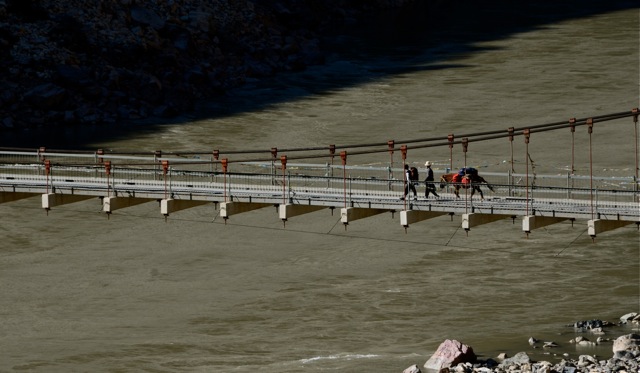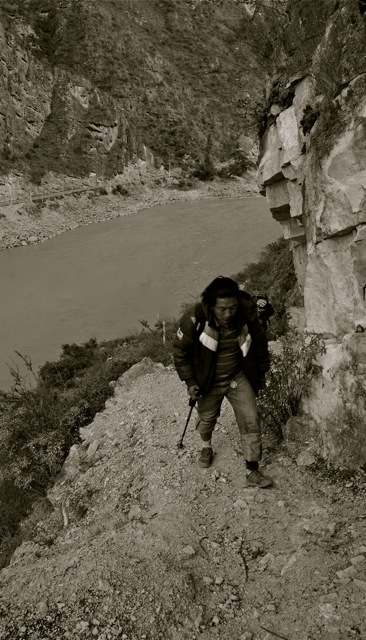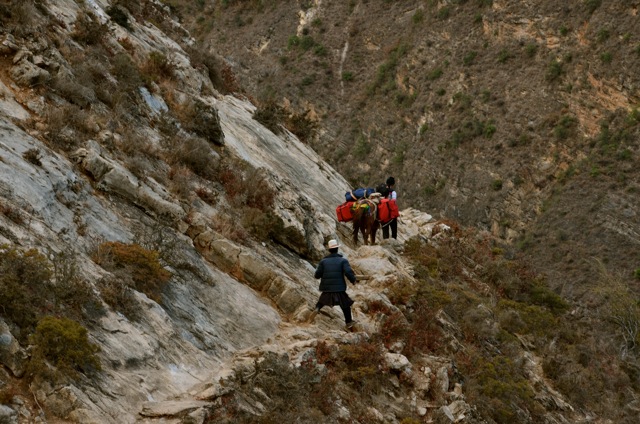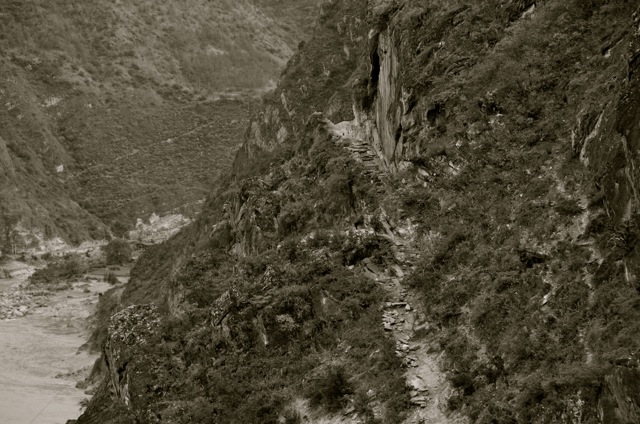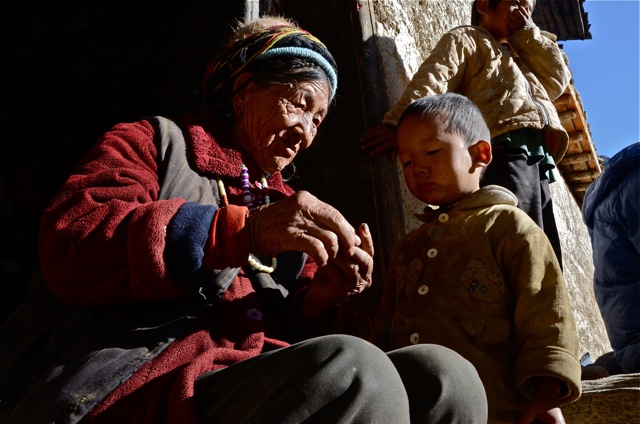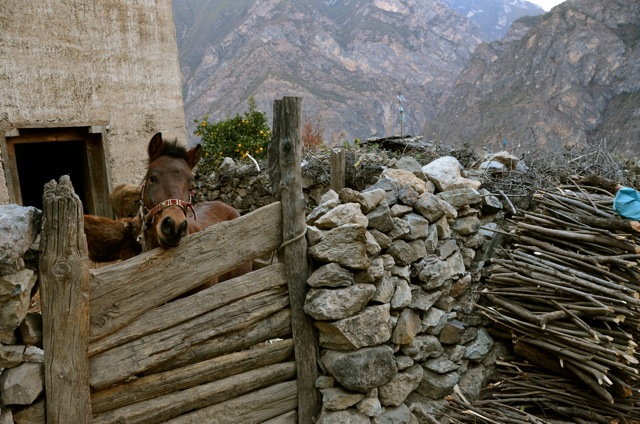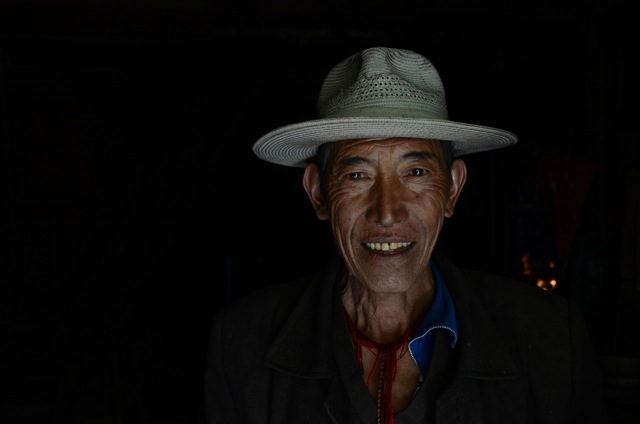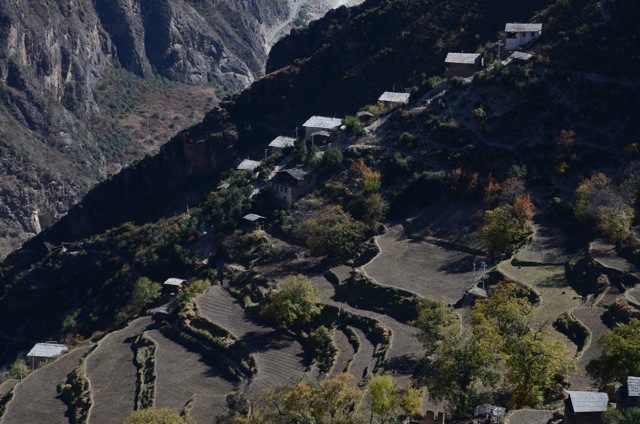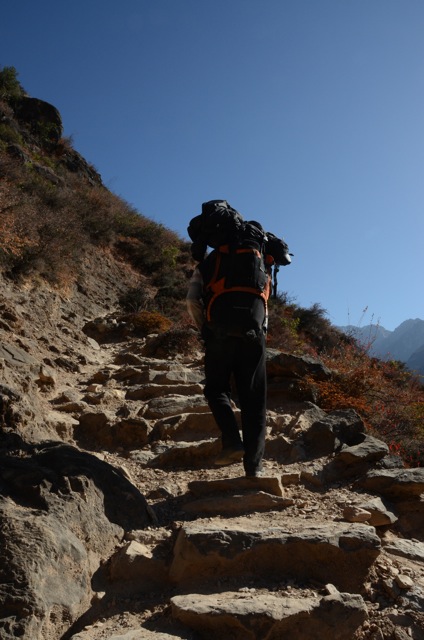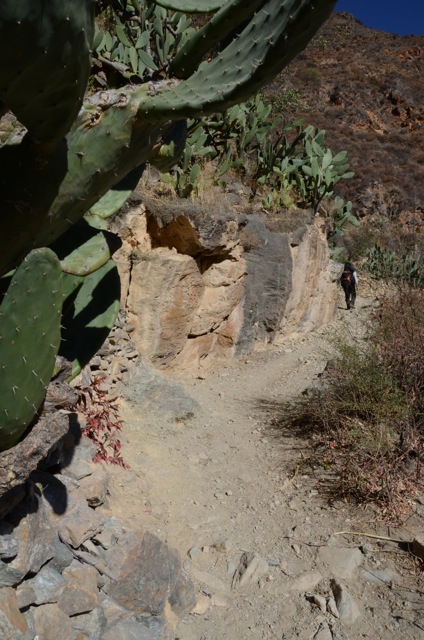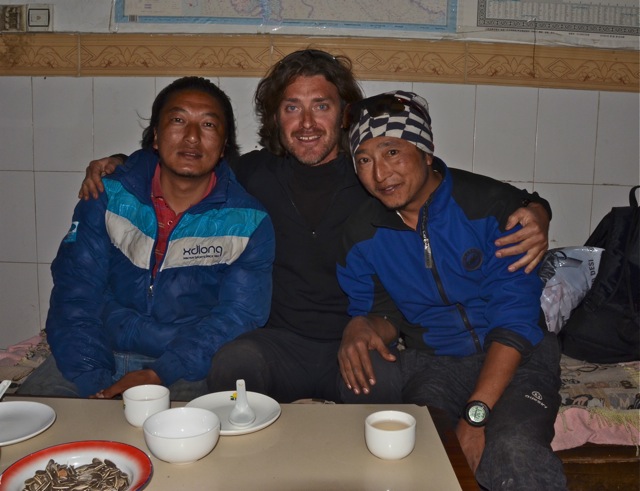Heat and its lethargy inducing powers have long played havoc with my own senses and perspectives. I am not alone in this feeling. Exiting our safe cool forests, and descending into the hot valleys, I feel the itch of impatience and the head gets heavy. Tenzin has an almost psychotic look in his eye brought on by the heat and only Yanpi looks to have escaped its effects. Ngawa is covered in a second skin of sweat but still he will not shed clothing nor slow down. He is intent on getting to his native home and it is as though a beacon of light that draws him on is leading him. At one point Tenzin loses patience with Ngawa’s relentless pace and he wastes no time in telling Ngawa that his pace is “too macho” and that on our journey, “we cannot be worried about impressing eachother with our strength”. Ngawa, a fiercely proud man with a notorious temper and fighting skills to match looks at Tenzin gently and surprisingly says nothing, but noticeably drops the pace slightly. He then tells Tenzin that thus far, he has been using a slow pace and that Tenzin must speed up.
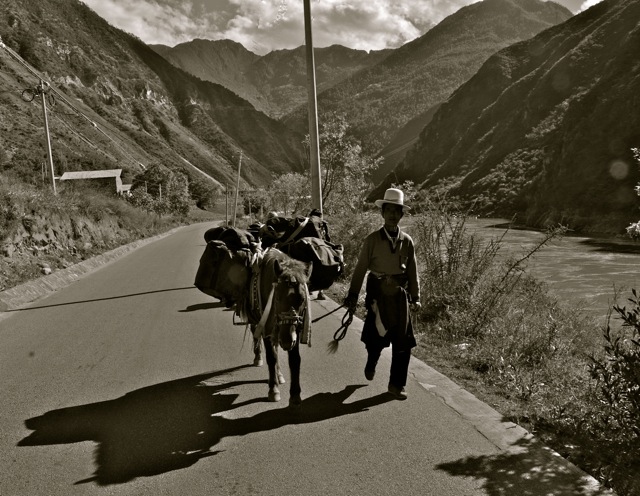
Songjè leads his horse along the hot Yangtze valley. To the right is the Yangtze River, which at this time of year is a slow moving behemoth.
At last we meet the Yangtze, which at this time of year is a golden mud colour and it too looks lethargic as though mirroring our own team’s feeling with the heat. Our lunch, taken over a fire is a silent affair while the sun continues to bludgeon us with its power. It isn’t only the sun which disturbs us. We have come back to vestiges of the ‘world of civilization’ and along the river vehicles re-enter our lives. They seem strange and totally foreign.
Our journey continues by foot along a main road for 10 kilometres before crossing a bridge to the western side of the Yangtze. Crossing the bridge I notice Tenzin limping. Both of his formidable feet have developed blisters and he is silently grimacing with each step. The heat has created humidity and friction in his boots and he slows, while Ngawa, heeding no one’s attempts to slow down is now far out in front.
Everything is dry with dust puffing up under each step. Our team is now spread over a kilometer in length like a small chain of dark figures. Again we are ascending along a path that continues to narrow as though it might eventually disappear altogether. Our route now teases me as the rocks have been worn down into grooves showing the undeniable evidence of the centuries of hoofs and caravan traffic. As the landscape changes, so too does my impression of the route and I cannot help but notice that we are leaving one powerful geography and heading into another.
Mountains seem to be able to recreate landscapes at will. Every hundred metres our entire site-line changes as we are offered up new vistas. The sunlight too rearranges shadows and highlights making new worlds appear.
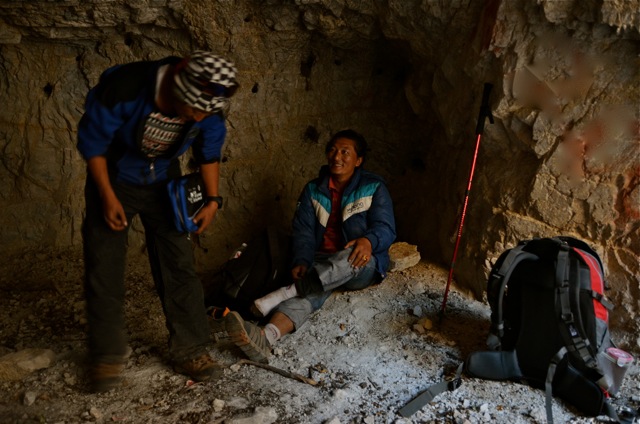
Tenzin (left) and Yanpi take refuge in a cave. In Tenzin’s left hand is a medical kit which he use to treat his feet, which by this point are simply raw pieces of meat.
Yanpi’s movie star features have darkened in the sun and even he too has gone silent in the midst of the trek. Tenzin, Yanpi and I take a break in a cave along the route, where Tenzin can bandage his feet which are bright red, swollen and full of white blisters. In the fading afternoon light we realize we cannot delay too much as to be stranded on the ledges in the dark would be a daunting task.
Ahead of us Ngawa leads the horse once again, while Songjè (who we later find out suffers from a bit of vertigo) scurries after him, at times doing anything he can to avoid looking down at the sudden plunge off to our right. His figure at times seems to do a little dance pursuing his own horse and Ngawa.
Coming around a bend I am halted by Ngawa’s screams. I spot him maybe 500 metres ahead but cannot hear his words clearly above the wind, which is now starting to blow in with more power. Ngawa holds up his hand to stop and then points up above me. I hear the dangerous sounds of clattering rocks and then there is a whoosh as a small landslide skids, and races down the mountain right where I would have been. High above our route, fearless goats scamper about on the loose dirt, which starts off little rockslides randomly, which cascade down like water.
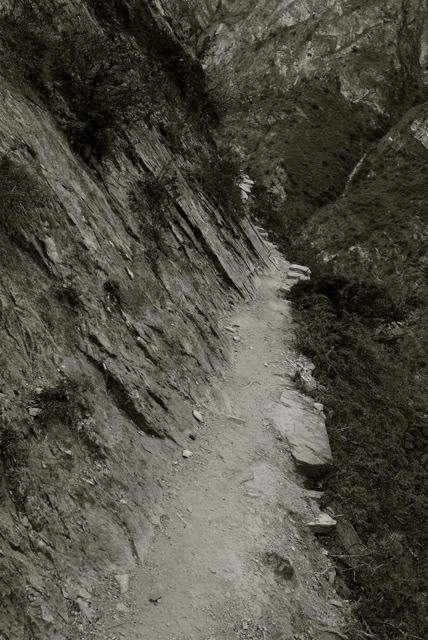
A mere strip of route remains along our passage…off to the right a 50 metre plunge to stone and the Yangtze awaits
Our route is a marvel. Cutting through stone while following the inevitable contours of the land and mountains, it is a blend of both man’s will and fealty to the powers of nature and economics. It is what makes the Tea Horse Road’ eternal …unstoppable, unending and relentless. No snow pass, no sheer ledge or cliff can retard its push forward through the mountains.
When we all do reach Ngawa’s hometown of Dura, it is with a relief as the sky’s light drops off quickly in the November sky and the trails are no place to be when the dark night sky moves in.
Ngawa’s ancient father, a man who travelled for 30 years along the caravan trails and who managed to father 12 children is a remarkably soft looking man who seems quite content with life. He immediately gravitates to Songjè and welcomes him and his horse taking the horse for some treats…even at close to ninety-years old he knows well that a happy horse is a necessity. Ngawa’s mother is the fire-breather and is a dark figure of lines, twinkling eyes and mischief. She howls with laughter at Songjè’s tales of the fearsome route and berates her son Ngawa for risking such a “handsome man and horse “. She has hands like cleavers and apart from layers of lines on her face, she is spry, feisty and in perpetual motion.
It feels good arriving in a community and being cared for. Ngawa, Songjè, Tenzin, and Yanpi are all basking in the attention of being guests and slightly exotic arrivals to the town. Reaching here I realize that as much as we crave the attention and little luxuries that a town can offer, we are also slightly out of practice at being social and must remember our manners.
We feast in a series of silent attacks, followed by butter tea and then drop off into the world of sleep quickly. Tenzin’s feet are a mess of red swelling and he is in silent pain. He walks with the stiff-limbed motion of someone whose muscles and skin are all in rebellion. We all sleep upstairs in simple wooden rooms with our sleeping bags layed out but I move out onto an open area so that I can see the nighttime sky. It is one of the world’s great wonders: to see stars looming above you as you pass into the world of sleep.
Two days later and heat is still in our lives, though more and more often there are breaths of the mountains hitting us. Amidst the heat there are sudden gusts of clear, sinus cleansing cold winds; and then they are gone but these winds bare the unmistakable tang of the Himalayas and the beckon us on.
We wind our way through the valleys and course through small towns that have remained off-grid for centuries. Ngawa is a beast. He insists on leading and he takes only minimal breaks, sometimes speaking to villagers and explaining later to us in that very local way that the person was “my father’s, brother’s, wife’s youngest son”, or something equally complicated. His isn’t a complicated person and his strengths and weaknesses are there for all to see, but he is beyond all other things, loyal to those who he deems worthy of his respect.
Knees and joints are starting to feel that comfortable kind of strain that most good treks bring with them. Our days are anywhere from 6-10 hours of trekking a day and what challenges the muscles and bones is the non-stop series of ascents and descents. We are rarely on flat ground for more than an hour and progress always seems slower than one would like. The mountains though, are like this: they slowly make one understand that they demand patience, strength and understanding. Anything less and they will grind you into dust without offering up any of its magic to console you.
We make it to the ancient town of Ponzera (known now as Benzilan), a heat-infested town that remains a domain of sun year round. Locked into a valley along the Yangtze River it was a town with the caravan routes and the Tea Horse Road literally in its every breath for hundreds of years. Known for exquisitely carved butter tea bowls, made from the roots of rhododendron bushes and trees, Ponzera became known for providing the caravan teams with the very best muleteers.
Yanpi, for one night at least, doesn’t have to worry about cooking as we visit a local restaurant and assault as many vegetable and mushroom dishes as we can manage. We are stained with dust and sun, and every piece of clothing and hair smells of acrid wood smoke. Tenzin’s eyes are bloodshot from the sun and pain that still throbs in the souls of his feet.
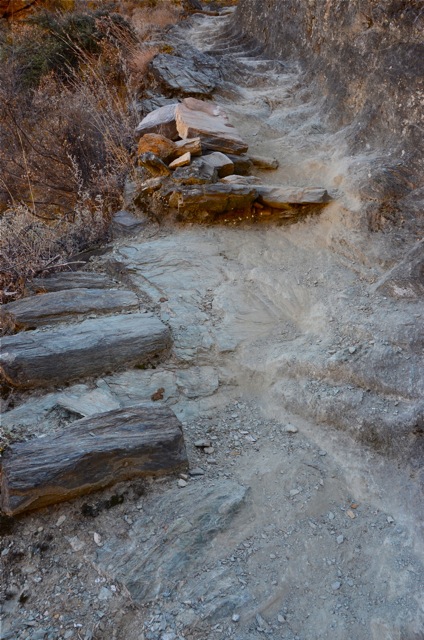
Weathered and worn, a portion of the Tea Horse Road lies etched along a mountainside. We are the only travellers along its length on this day.
We learn that Ngawa will not join us for the remainder of our journey. His wife has called him and even a force such as Ngawa doesn’t dare risk the ire of a wife. It is a sudden announcement but in some ways a little comical. This mountain-bred man of incalculable toughness and grit being called by his wife who demands he return immediately.
After Ponzera, our bodies will be required to ascend once again. We will be moving through the lands which hum and suffer under the Himalayan wind’s force. We are getting ever closer to our sacred Shola Pass as well.
Ngawa leaves us and tells me to “greet the great pass for me”. He and I had been to the Shola Pass earlier in the year and the mighty beauty and ferocious elements had brought tears to the tough man’s eyes. When he left he looked downcast, as he would have much rather joined us to ascend the pass than head home, but I knew his wife well and she was not a woman to mess with. He understood his duty to home well.
Yanpi tells me later, “we’ll miss his strength in the mountains”. As we would find out, we would indeed miss him in the mountains.

